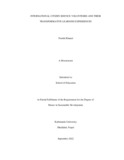
Please use this identifier to cite or link to this item:
https://hdl.handle.net/20.500.14301/113| Title: | INTERNATIONAL CITIZEN SERVICE VOLUNTEERS AND THEIR TRANSFORMATIVE LEARNING EXPERIENCES |
| Authors: | Khanal, Prashit |
| Citation: | Khanal, P. (2022). International Citizen Service Volunteers and their Transformative Learning Experiences. [Unpublished Masters Dissertation], Kathmandu University. |
| Issue Date: | Sep-2022 |
| School: | SOED |
| Department: | DODE |
| Level: | Masters |
| Program: | KUMSD |
| Keywords: | Transformative learning, volunteer, volunteering, International Citizen Service |
| Abstract: | When something unexpected happens that causes people to re-evaluate their ideas or way of life, as well as when they attempt to make sense of the event and what caused it, transformative learning takes place. Volunteering organisations frequently assert that enduring cathartic experiences or novel exposures can lead to transformative learning. Volunteering has become a platform for volunteers to transform themselves by working in challenging situations. Nevertheless, it is unclear on how the process of transformative learning occurs. I address my research question— How do ICS volunteers experience transformative learning? —by applying a case study approach and speaking with eight former International Citizen Service (ICS) volunteers from Raleigh International Nepal. The research found that the ICS volunteering experience made volunteers’ beliefs anew by challenging their uncritical presumptions about leadership, cultural stigmas, II perspective to see others, and to reassess their trajectory of career. This analysis was done using transformative learning theories of Mezirow, Taylor, and Dirkx via an integrated approach. Volunteers had to confront their naïve presumptions and conceptions of the direction of their lives. Volunteers revised their beliefs by utilising rational thinking, non critical appraisal of beliefs, and by assessing their emotions. The research concludes that ICS elements such as living in a new culture, sharing space with peer volunteers, working in a team, and reinforcing systems of mentorship, passionate and fervent conversations, observing peers in action, and altruistic experiences ushers in the rational, non-rational, and extra-rational transformative learning. |
| URI: | http://101.251.6.110:8080/handle/20.500.14301/113 |
| Appears in Collections: | Dissertations |
Files in This Item:
| File | Description | Size | Format | |
|---|---|---|---|---|
| Prashit Khanal-MSD.pdf | 1.06 MB | Adobe PDF |  View/Open |
Items in DSpace are protected by copyright, with all rights reserved, unless otherwise indicated.